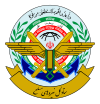HESA Shafaq
| Shafaq | |
|---|---|
 | |
| General information | |
| Type | Trainer / Attack aircraft |
| National origin | Iran |
| Manufacturer | Iran Aircraft Manufacturing Industrial Company (HESA) |
| Designer | |
| Status | Prototype |
| Primary user | Iran |
| Number built | One prototype |
| History | |
| First flight | 2017 (forecast, but not achieved) |
| Developed from | M-ATF |
The HESA Shafaq or Shafagh (Persian: هواپیمای شفق, "Twilight" or "Aurora") is an Iranian subsonic stealth aircraft project being developed by the Iran Aircraft Manufacturing Industrial Company (HESA).[1]
Development
According to reports, the Shafaq will be a subsonic aircraft, but this might be changed. Additionally, Iranian officials have reported that the Shafaq will have a skin of radar-absorbing material.[2]
This two-seat advanced training and attack aircraft appears to be based[3] on the Russian-Iranian "Project Integral" and is fitted with Russian ejection seats. Reportedly, there are plans to produce three versions—a two-seat trainer/light strike version and two one-seat fighter-bomber versions.[1]
The Shafaq is designed by the Aviation University Complex (AUC), part of the Malek-Ashtar University of Technology (MUT). At the start of the program, Iran received help from Russia[3] and the aircraft was known as Integral. Russia later backed away from this project for several reasons[citation needed] and Iran carried on the project by itself renaming it Shafaq. The Shafaq is designed as a sub-sonic aircraft,[3] and made of radar-absorbing material. It has a large leading edge root extension (LERX) and a root aft of the wing which gives it an unusual circular sub-section.[1]
A 1/7 scale model of the Shafaq has already completed testing in the AUC's wind tunnel and pictures have already been revealed which show that a full-scale model has already been built.[3] The Shafaq will be built in different configurations including a two-seater trainer, a two-seater light Attack and a one-seater light attack variants. Roll-out of the first prototype was scheduled for 2008.[2] The Shafaq's advanced cockpit features color MFDs and a Russian-made K-36D ejection seat.
According to AIO (Aerospace Industries Organisation), the aircraft was expected to be flight tested during 2017, and featuring twin, outwardly canted vertical fins. This type of a tail design has become a favoured aerodynamic feature of Iranian designers that dates back to the development of the reverse-engineered Iranian version of the Northrop F-5, the HESA Saeqeh.[4]
Specifications
Data from Trend[5]
General characteristics
- Crew: 1 or 2
- Length: 10.84 m (35 ft 7 in)
- Wingspan: 10.45 m (34 ft 3 in)
- Height: 4.26 m (14 ft 0 in)
- Empty weight: 4,361 kg (9,614 lb)
- Max takeoff weight: 6,900 kg (15,212 lb)
- Powerplant: 1 × Klimov RD-33 turbofan engine, 50 kN (11,000 lbf) thrust
Performance
- Service ceiling: 16,780 m (55,050 ft)
- Rate of climb: 110 m/s (22,000 ft/min)
Armament
- Missiles: Sattar, Shahbaz or Fatter missiles
See also
Aircraft of comparable role, configuration, and era
Related lists
References
- ^ a b c "Shafaq". globalsecurity.
- ^ a b Johnson, Reuben. "Iran struggles to field a fighter". ainonline. Archived from the original on 26 February 2008.
- ^ a b c d Larkins Dsouza (22 September 2007). "Shafaq- Iranian Stealth Plane". defenceaviation. Archived from the original on 14 February 2016. Retrieved 25 October 2011.
- ^ "Iranian Shafaq jet trainer nears prototype testing | IHS Jane's 360". www.janes.com. Retrieved 15 March 2017.
- ^ "Iran unveiled new indigenous fighter jet". Trend. 2 February 2013. Archived from the original on 4 February 2013. Retrieved 4 March 2016.
External links
- GlobalSecurity.org: Shafaq (Before Dawn)
- ainonline.com: Iran struggles to field a fighter Archived 4 September 2014 at the Wayback Machine
- aeronautics.ru: aka "Vityaz-2000": a Russian based JSF[dead link]

